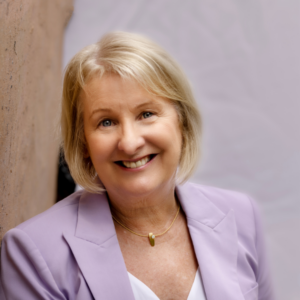Keynote speaker

Changing the equity outcome
Australia’s equity landscape is changing and impacting on individuals, communities, and society at large. Education squarely sits as a great asset and investment to improve the life chances, choices and opportunities for individuals, to assist strengthen communities and to contribute to the productivity of our country. At the heart of education rests the core tenants of teaching and learning. Ensuring that the teaching profession is well supported, has access to and uses research and evidence to inform pedagogy and practice, will greatly assist in changing the equity outcome for the better.
Keynote speaker

Addressing education’s thorniest challenges: Beyond simple solutions
Laureate Professor Jenny Gore AM is Director of the Teachers and Teaching Research Centre at the University of Newcastle. Her research tackles persistent educational challenges through comprehensive programs of research on teacher development, pedagogical reform, enhancing student outcomes, and the formation of student aspirations.
Her ongoing work with colleagues on Quality Teaching and Quality Teaching Rounds over the last decade has shown how this framework can effectively support teacher professional development, increase teacher satisfaction, enhance teaching quality in schools, and improve student achievement while narrowing equity gaps.
Plenary speaker

Stress less, laugh more
Anthony Ackroyd is one of Australia’s most successful comedians, speakers and writers. He became a household name as a star of ABC TV’s legendary comedy series The Big Gig and has performed and written for hundreds of Australian and international TV shows, radio programmes, and feature films.
Anthony is recognised as a leading authority on the social and cultural impacts of comedy, and has been widely published on this subject. He applies his unique talents to uplifting, entertaining and inspiring. Anthony teaches people how to deliberately and skilfully enjoy, create and express humour and laughter at work to reap the rewards.
Invited speaker

Priority work at AITSL and the NSW Department of Education
Mark Grant will give an overview of his work during his time at AITSL and teaching and learning priorities from the perspective of his new position at the NSW Department of Education. His discussion of AITSL work will cover the National Teacher Workforce Action Plan; bilateral work, including the Conran Review of COAG; and an explanation of internationally-focused initiatives. He will also give an overview of priorities for the NSW Department of Education, including its new Plan for Public Education, the launch of its explicit teaching focus, key challenges and opportunities.
Invited speaker

How does generative AI work and its implications for education
This presentation will explore the inner workings of generative AI, focusing on larger language models like ChatGPT. Delving into its strengths and limitations, we dissect how these systems generate human-like content. Furthermore, we examine the profound impact of generative AI, alongside classification models, on education and learning and how this has the potential to revolutionise educational practices.
Invited speaker

Supporting positive attitudes in STEM subjects
Student attitudes to science and mathematics are influenced by a range of personal and social factors including the learning experiences they encounter in school. These factors are related to student achievement levels and their intentions to continue to study STEM subjects in upper secondary school and beyond. In this presentation, the relationships between these influences will be explored along with implications for teachers to support and maintain the development of positive attitudes.
Invited speaker


Transforming lives through learning: Insights from the NSW Regional South School Performance Directorate
The Plan for NSW Public Education commits us to deliver outstanding leadership by supporting staff development through high-quality and accessible professional learning to strengthen educational and instructional leadership and develop high-quality assessment processes. The QT Strengthening Program Design professional development was presented to five of our high schools and supported the professional growth of all teaching staff to deepen teaching practice for ongoing growth in student progress and achievement. Schools have enhanced current practices to ensure high quality pedagogy underpins all lesson and assessment planning. With the new curriculum rolling out in schools across Australia, it’s the perfect time to boost programming skills to deliver school excellence through continuous improvement.
Chair: Dr Drew Miller
Panellists: Associate Professor Mark Rickinson, Pete Riley and Belinda Cooper
Data vs evidence: What’s the difference and how can you use both well in schools
School leaders and teachers are under increasing pressure to use and collect evidence in their classrooms to inform their practice. But identifying, understanding and using quality evidence can be complex. How do you navigate this complexity to ensure what you’re doing is truly making a difference in today’s complex classrooms?
In this panel, Dr Drew Miller will lead a discussion with Associate Professor Mark Rickinson from Monash University’s Q Project, Cessnock High School Principal, Peter Riley, and Cessnock High School Deputy Principal, Belinda Cooper, on how schools can understand quality evidence and use their data to inform school change initiatives. The Q Project is an Australian first, investigating how research evidence is used in schools, and how to support educators to better use that evidence in their practice. Cessnock High School just completed a four year partnership with the University of Newcastle which saw them achieve enormous gains in NAPLAN and HSC results, as well as significant turnaround in behaviour and attendance.
Chair: Dr Sally Patfield
Panellists: Dr Fiona Longmuir, Mary Ryan and Kaitlin Heggen
Rethinking induction: How can we set up teachers for success and use induction to build school culture
Despite the introduction of national induction guidelines in 2016 (and updated in December 2023), there is still little consensus on best-practice induction for early career teachers and new school leaders. Induction is frequently confused with orientation and/or mentoring only, rather than seen as an initial phase in a continuum of professional learning, and 40 percent of teachers report they received no formal induction at all.
In this panel, Dr Sally Patfield will lead the discussion between Dr Fiona Longmuir a researcher in teacher wellbeing and principals’ emotional labour at Monash University, Mary Ryan, head of Professional Learning and Accreditation at Catholic Schools NSW, and Kaitlin Heggen, an early career teacher at Hambledon Public School.
Introduction to the Quality Teaching Model
This 90 minute interactive session is designed to familiarise you with the QT Model as it relates to classroom practice. The Quality Teaching Rounds Advisers will walk you through the Model’s dimensions and elements, ideal for those who haven’t engaged with it for a while or are coming to the Model for the first time. We’ll use an abbreviated form of the Quality Teaching Rounds (QTR) process to analyse a short lesson extract through the lens of the Model. This session offers an intense burst of information while providing a taste of the powerful QTR conversations that can shift thinking about classroom practice.
Rethinking assessment and programming through the lens of the QT Model
Michelle Ware
Quality Teaching Academy
QT and explicit teaching: Towards stronger practice
Katie Robinson
School of Education, University of Newcastle
Stay focused: The effects of classroom-based resistance training breaks on adolescents’ cognitive function
Tess Rendoth
School of Education, University of Newcastle
Telling tales and playing games: A case study in how storytelling is at the centre of learning
Dr David Roy
School of Education, University of Newcastle
Masks, identity, and inclusion in the classroom
Dr Nick Riley
School of Education, University of Newcastle
Thinking while moving: Embedding movement based learning in schools
Brooke Rosser
Teachers and Teaching Research Centre, University of Newcastle
Capitalising on collegiality through Quality Teaching Rounds: An investment in social capital for whole-school improvement
Associate Professor Heather Sharp
School of Education, University of Newcastle
Experiential learning on an international study tour: WWI history through monuments and memorials
Dr Sally Patfield
Teachers and Teaching Research Centre, University of Newcastle
The value and benefits of Quality Teaching Rounds Digital for rural educators and schools
Dr Julia Vagg
Teachers and Teaching Research Centre, University of Newcastle
Nurturing connections: Expanding possibilities of practice through relational professional development
Matt McInnes
Teachers and Teaching Research Centre, University of Newcastle
Translating teacher professional development: Exploring the impact of culture on adopting new professional development programs
Rachel Birch
School of Education, University of Newcastle
Is there cause for controversy? Exploring the evidence on decodable and levelled texts
Dr Drew Miller
Teachers and Teaching Research Centre, University of Newcastle
School health and burnout: Insights from the QT Pulse survey
Dr Leanne Fray
Teachers and Teaching Research Centre, University of Newcastle
Quality Teaching in Initial Teacher Education
Julie Cowan
Teachers and Teaching Research Centre, University of Newcastle
Adapting QT to support teachers in resource-poor contexts
Dr Drew Miller
Teachers and Teaching Research Centre, University of Newcastle
Where the magic happens: A deep dive into the relationship between Quality Teaching and student achievement
Dr Leanne Fray and Michelle Ware
Teachers and Teaching Research Centre, University of Newcastle
Unveiling the impact of QT Assessment Rounds
Dr Drew Miller, Peter Riley and Belinda Cooper
Cessnock High School
Building school capacity through partnership: Four year outcomes at Cessnock High School
Kate Hehir
Lauriston Girls School
Leading Quality Teaching in the Junior School at Lauriston Girls’ School (Victoria)
Rob Barter, Beth Filipo and Kate Shorland
Quality Teaching Academy
QTA exposé
Merryn O’Dea, Emma Smith, Kerrie-Anne Grant, Georgie Kelley and Elise Sutherland
Lyneham Primary School
Using QTR as a school improvement implementation tool
Kelly Jesser, Sam Morley and Jeralee Brown
Tullamore Central School
A hybrid model: Finding the ‘best fit’ for your school context
Robyn Press
Redlands College
Beginning teachers’ identity crisis: What factors shape their professional identity and what is needed to support them?
Kate Pidgeon and Warren Welham
Northlakes High School
Enhancing assessment practice using the QT Model
Emma Pay, Cassie Griffiths and Esse Rowlands
Danebank Anglican School for Girls
Building connection in a P-12 school through Quality Teaching Rounds
Elizabeth Papyiannis and Dr Leanne Fray
Sydney Children’s Hospital School
Supporting Quality Teaching in Hospital School settings
Casey Norden and Allison Lloyd
Illawarra Sports High School and Gundagai High School
Lifting Intellectual Quality and High Expectations through QTR: Insights from Gundagai High School and Illawarra Sports High School
Jeannette Kouzeleas and Mary Boatswain
Kellyville Public School
Insights and impacts: The Kellyville Public School QTR story
Cassandra Portelli, Simone Richardson and Majd Abu Swireh
NSW Department of Education
QT and the Maths Retraining Program
Tricia Warrington and Caroline Dickinson
Sapphire Coast Anglican College
Opening the doors at Sapphire Coast Anglican School
Jenny Harrison and Karen Porter
NSW Department of Education
Quality Teaching Rounds: Students with disability
Alex Schmidt
Lismore Heights Public School
Student-centred synergy: Fostering collaboration for learning
Novotel, Sydney Olympic Park
11A Olympic Blvd
Sydney Olympic Park
NSW 2127, Australia





